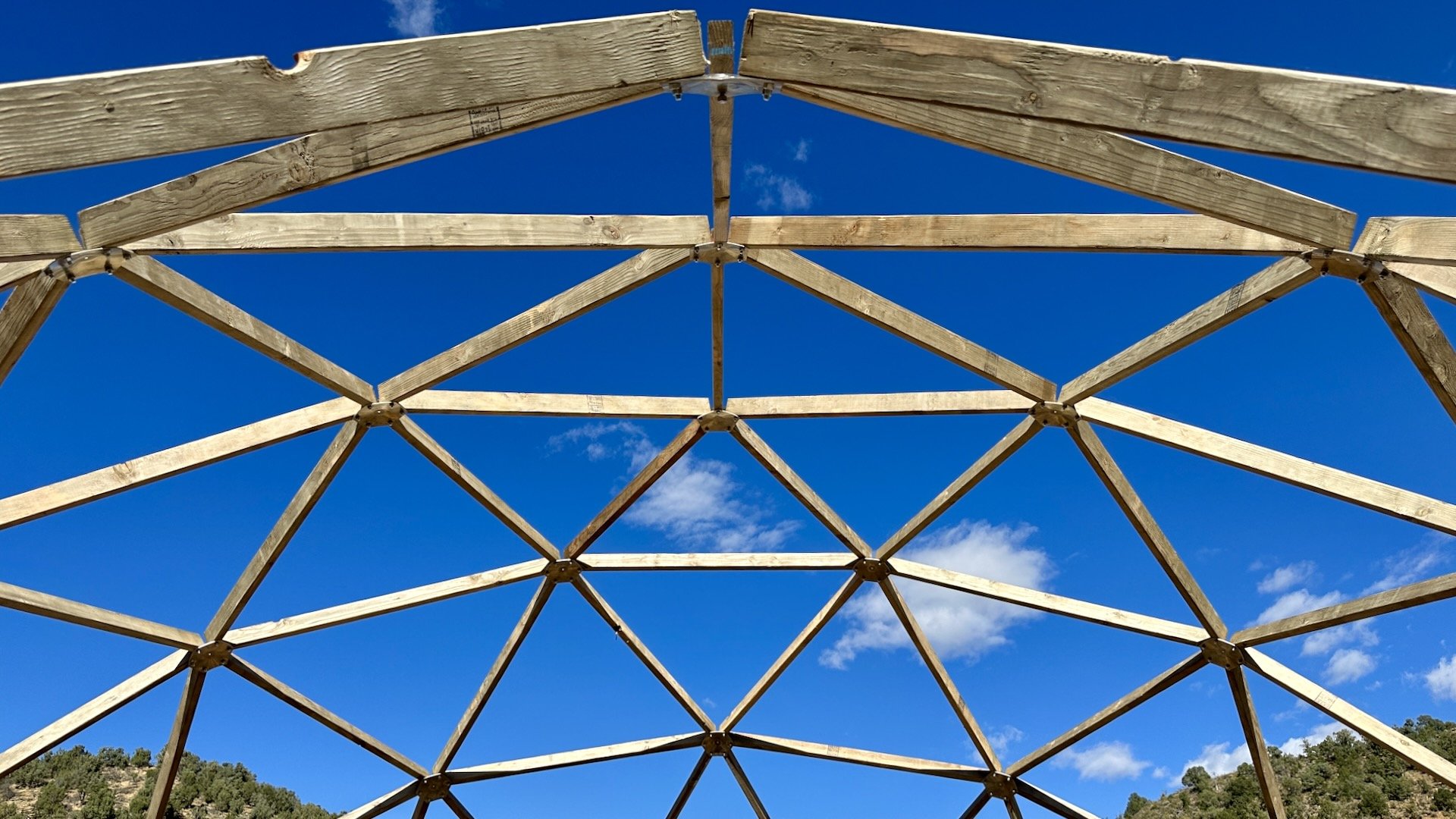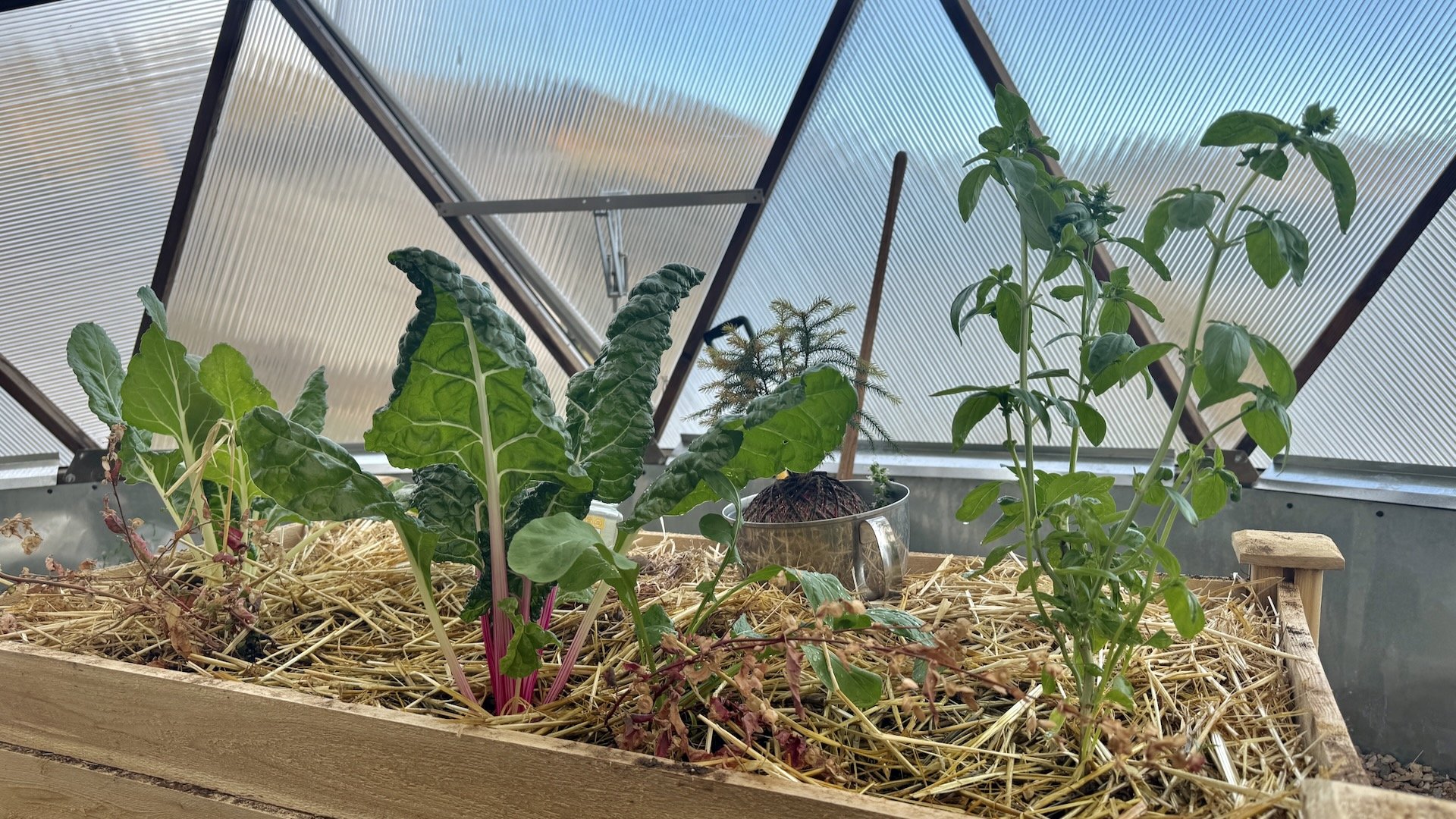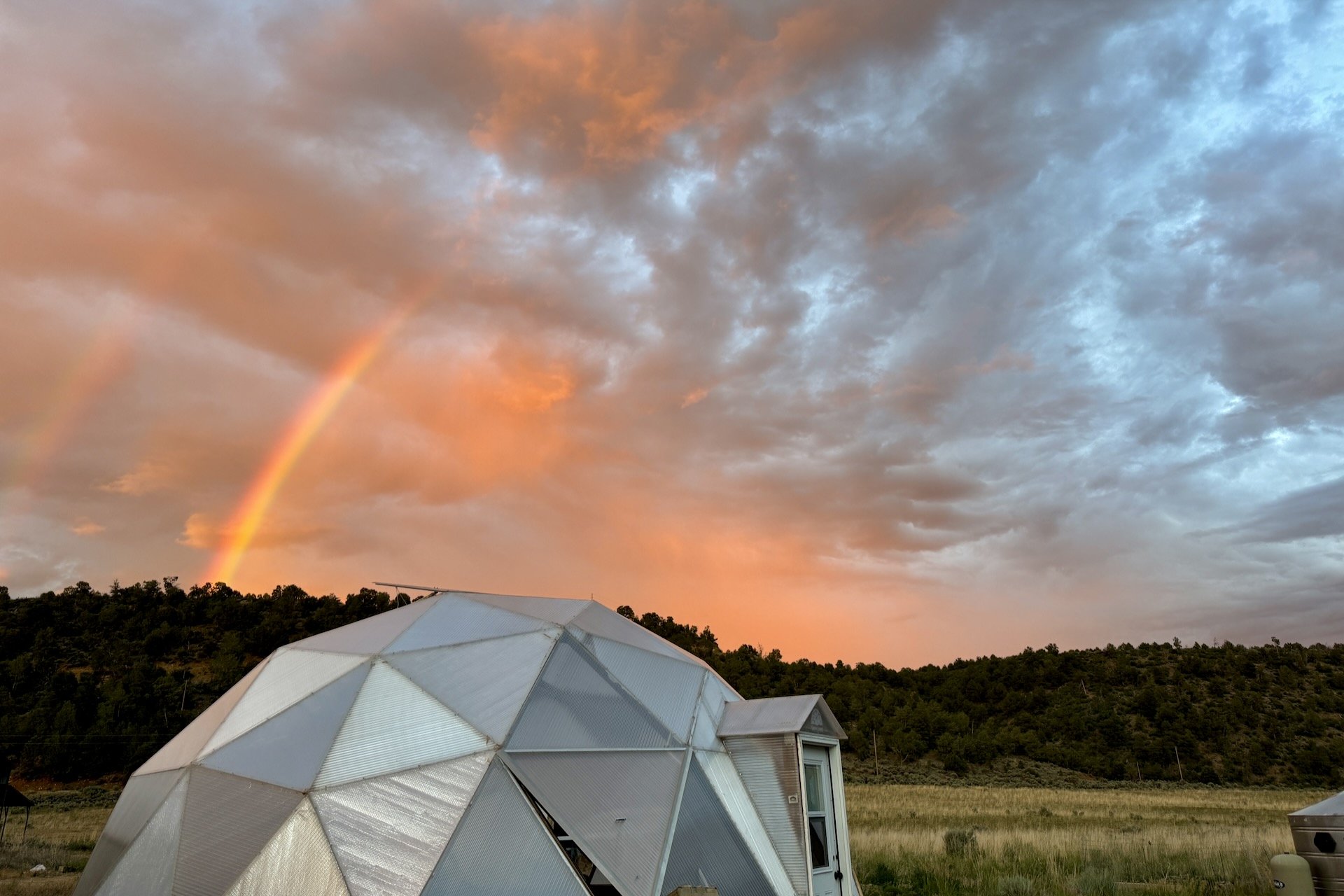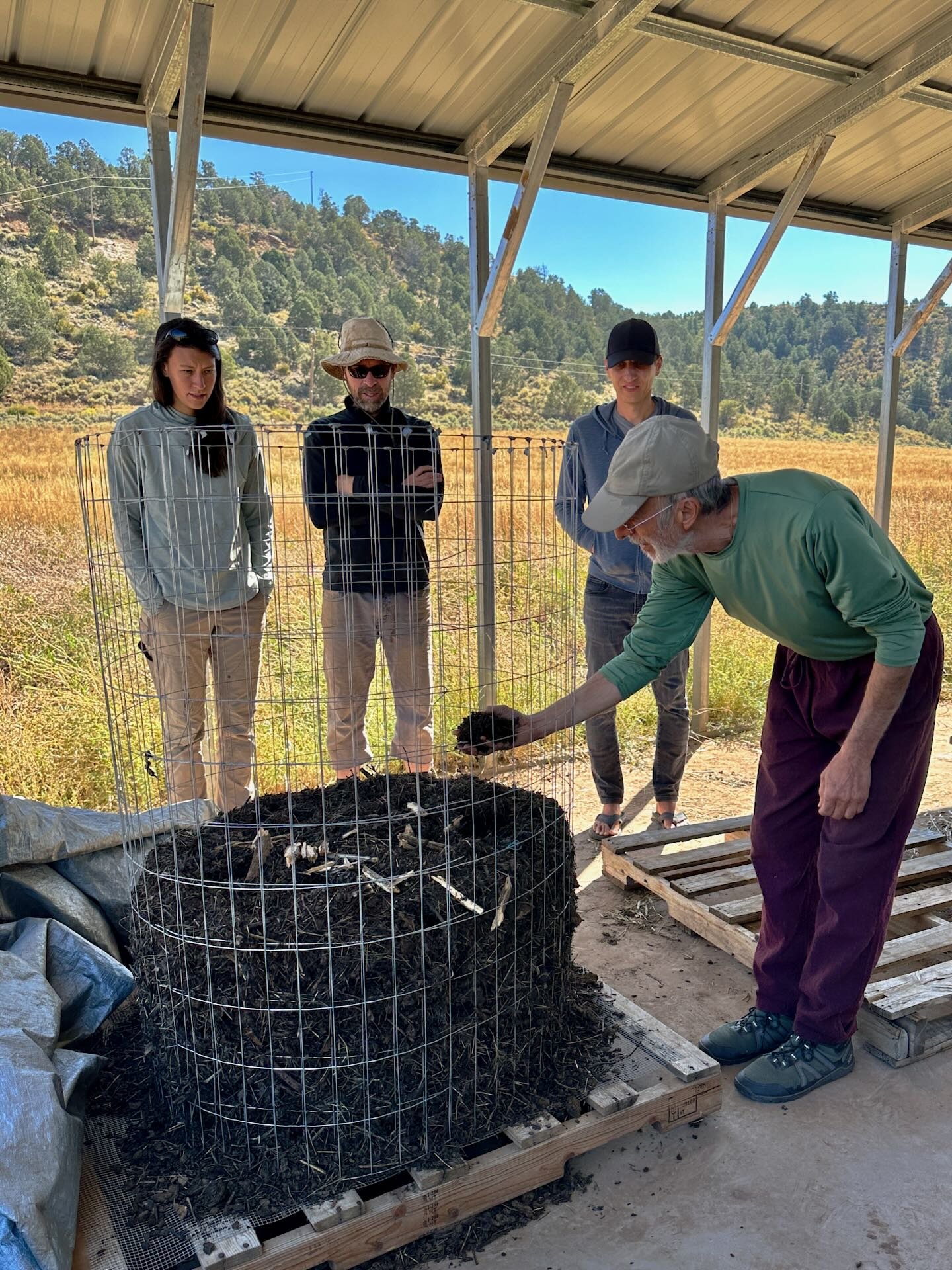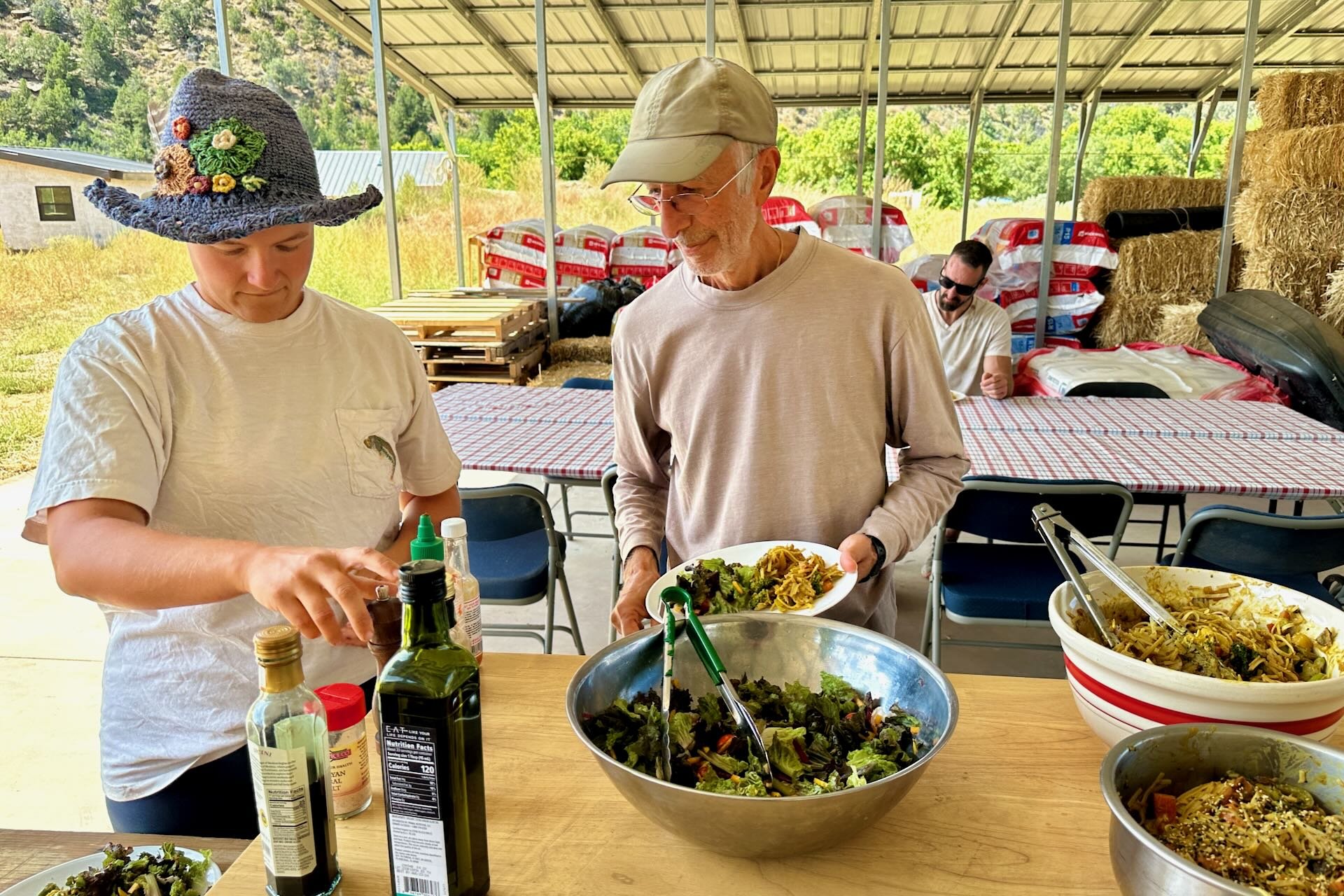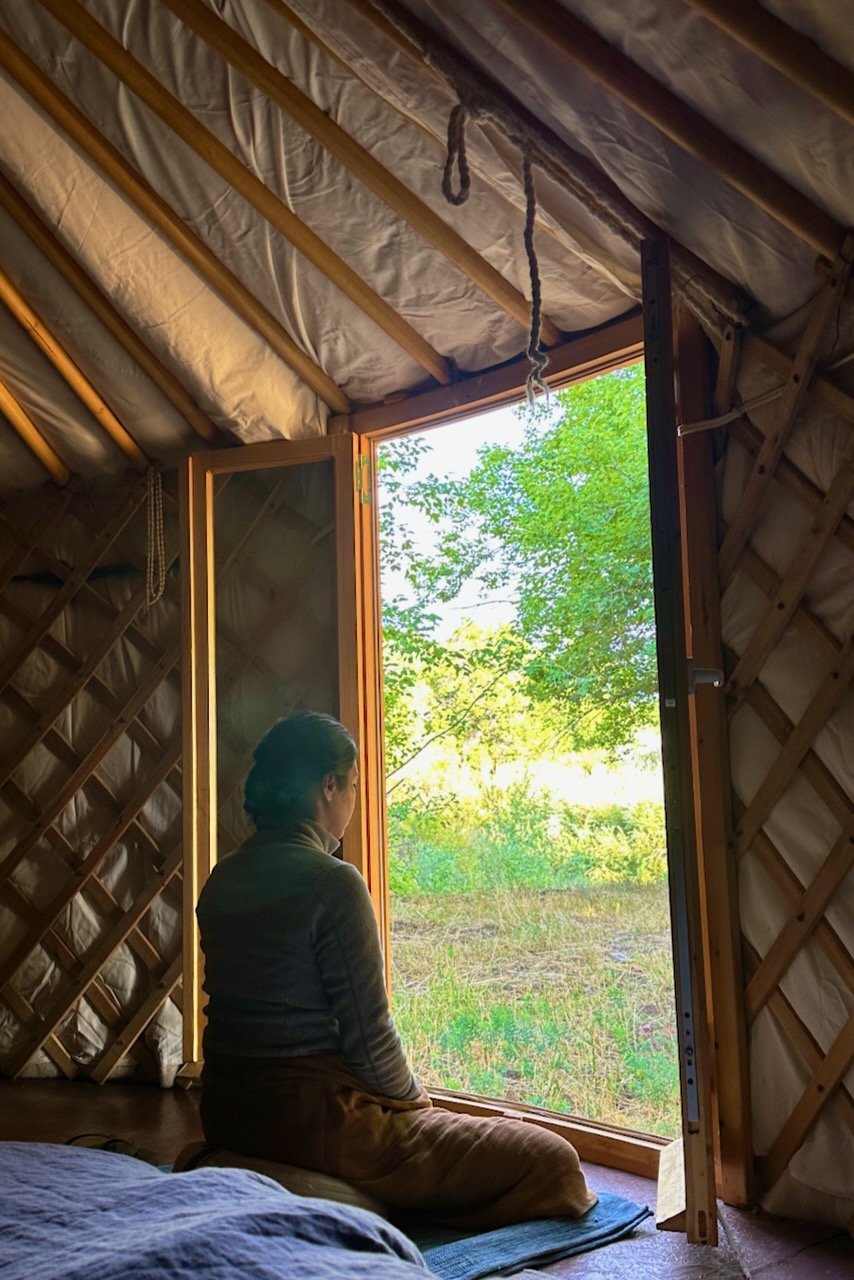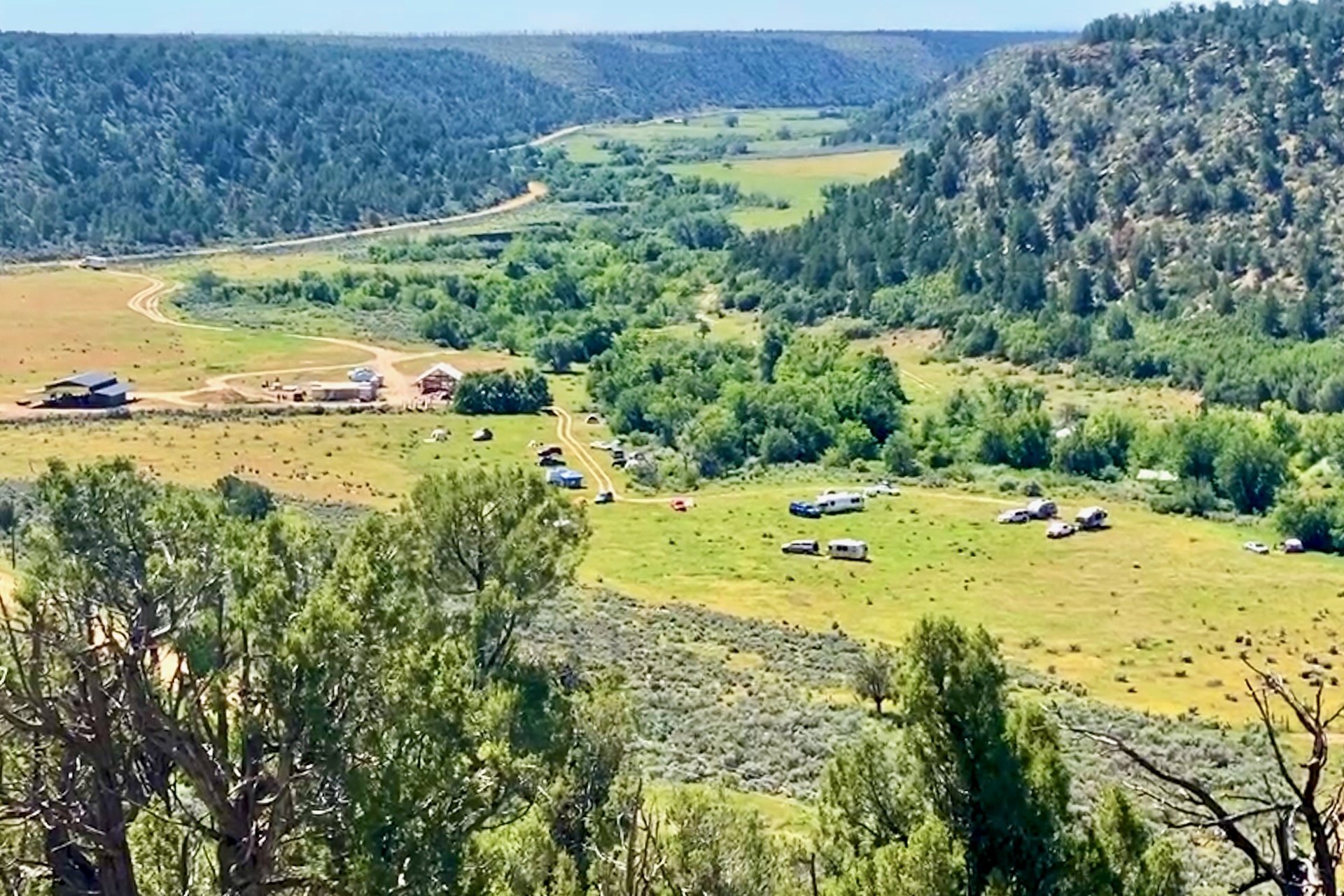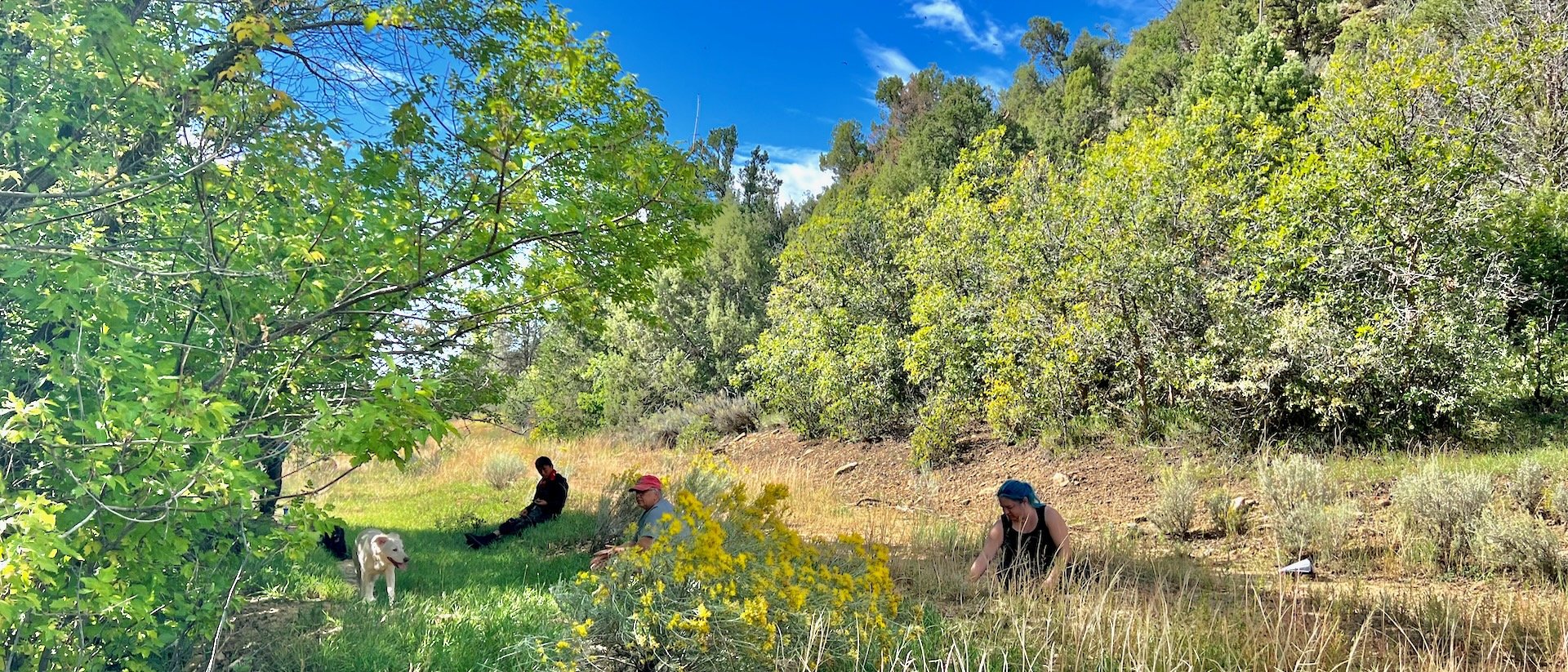ORGANIC GARDENING & GREENHOUSE WORKSHOP
A five-day adventure creating organic garden beds
in and around our geodome greenhouse
July 28 – August 1, 2025
AT A GLANCE
Location: Earthville Institute, Colorado
Dates: July 28 – August 1, 2025 (with possibility of staying on after as a volunteer)
Program type: Immersive residential service-learning workshop
Focus: Creating organic garden beds in and around a geodesic dome greenhouse (including both indoor and outdoor beds)
Instructors & facilitators: Mark Moore, and the Earthville team (see below)
Language: English (translation may be possible)
Building a Better World? Yes, this workshop-retreat qualifies as a module in the Building a Better World program and provides 1 week of credit toward certification in that program.
“One must learn by doing the thing. For, though you think you know it, you have no certainty until you try.”
— Aristotle
INTRODUCTION
Earthville Institute is pleased to welcome you to this immersive residential service-learning program integrating hands-on experience with contemplative practice in a healthy and supportive environment in the lap of nature. The focus of this workshop will be the creation of organic garden beds in and around our geodesic dome greenhouse (including both indoor and outdoor beds). It will include hands-on explorations of permaculture-inspired gardening techniques, natural building materials and methods and contemplations of permaculture philosophy and our place in nature.
Key topics of exploration:
Organic food-growing (including building healthy living soils, composting, mulching, etc.)
Natural building skills (including stone masonry and carpentry)
Permaculture principles
Healthy living: meditation, yoga, and more
ORGANIC GARDENING & PERMACULTURE PRINCIPLES
The concept of “permaculture” brings together some of our world’s oldest and most time-tested ideas about sensible and sustainable ways to design and manage human habitats in harmony with nature.
Some people think of permaculture as an advanced approach to natural food-growing — and it is that, to be sure, but it is also so much more. It’s about elegantly harmonious and resource-efficient relationships between the natural environment, the cultivated environment, and the built environment.
The permaculture approach seeks to understand the interconnectedness of everyone and everything in nature, all as living systems within larger living systems, and to design our homes, our gardens, our communities and ourselves accordingly, to support optimum flourishing of people and the planet with minimum use of resources.
In that understanding, everything we do at Earthville Institute aspires to the ideal of permaculture — not just the gardens, but also the buildings, the programs, the people, the hundreds of acres of wild nature, and the dynamic interactions among all these elements.
The entire setting of Windhorse Village (the budding ecovillage where Earthville Institute is based) is in the early stages of master planning according to principles that include the ideas expressed in permaculture as well as inspiration drawn from older traditional systems such as vastu, feng shui, and more.
In these early stages, one of the priorities is food, since everyone creating the institute needs to eat! For that reason, it’s none too early for programs exploring the food aspects of permaculture.
What we’ll be learning
During this workshop, we’ll be focusing primarily on these areas:
Building garden beds in and around our newly completed geodesic dome greenhouse (both inside and outside). This will include stone masonry using local stones (sourced on site) and lime-based mortar, which is a more eco-friendly way to build with stone.
Building healthy living soils with rich compost and life-supporting fungal activity.
Planting and tending gardens in the new beds, including mulching, watering, etc.
Food itself! We’ll also enjoy the later stages in the food chain: preparing delicious plant-based food and eating it!
Depending on participants’ interests and the needs on site, topics for further exploration might include:
Introduction to garden design: Siting a garden bed, companion planting, understanding a garden as a system within a system, good drainage, etc.
Key principles of permaculture: Natural systems, ecological and regenerative design, watersheds and water management, sustainable architecture and food-growing, efficient management of resources (stacking functions, etc.), and more
Composting: Ongoing development of site-specific recipes for life-supporting fungal-intensive compost, including adaptation of Elaine Ingham’s Soil Food Web systems and implementation of a localized model of a Johnson-Su bioreactor
Cooking and nutrition: A possibility for those interested in cooking healthy nutritious meals to learn more about the benefits of a organic, whole-food, plant-based diet
“Permaculture is a philosophy of working with, rather than against nature; of protracted and thoughtful observation rather than protracted and thoughtless labor; and of looking at plants and animals in all their functions, rather than treating any area as a single product system."
— Bill Mollison
“The sun shines not on us but in us. The rivers flow not past, but through us. Thrilling, tingling, vibrating every fiber and cell of the substance of our bodies, making them glide and sing.
The trees wave and the flowers bloom in our bodies as well as our souls, and every bird song, wind song, and tremendous storm song of the rocks in the heart of the mountains is our song, our very own, and sings our love.”
—John Muir
Integrating the inner life & the outer life
In support of the contemplative foundation of this program, there will be time for a group practice session every morning (e.g. meditation, yoga, chi kung, etc., which might be guided or unguided depending on the circumstances). For those who also wish to keep up their existing yoga and/or meditation practices, a practice space will be available in the mornings before breakfast and in the evenings.
CAMPUS LIFE: USEFUL THINGS TO KNOW
"Now I see the secret of making the best persons. It is to grow in the open air and to eat and sleep with the earth."
— Walt Whitman
Camping at Earthville: Healthy community living in the heart of nature
At this start-up stage in the development of our campus, we have no beds to offer, but we have a beautiful rustic campground, which is an ideal place for nature-loving people who are comfortable living very simply in the wild. Note that you’ll need to bring your own tent or, alternatively, you’re welcome to bring a camper or RV if you have one (our eco-campground has plenty of space, but no RV hookups). At this stage, we have outdoor showers with (limited) hot water, basic camp toilets and porta-potties. You do not need to bring any cooking gear, as we will provide all meals (and, due to forest fire risk, we cannot have open flames here).
The lifestyle here is focused on holistic well-being: organic plant-based food, nature walks, contemplative practices (meditation, yoga, etc.), and a healthy body and mind (free of intoxicants of all kinds). Earthville is a supportive place to be your healthiest self.
What kind of experience to expect
Two of the keys to happiness are: (1) to have realistic expectations to begin with; and (2) not to be too attached to those expectations, but rather to stay flexible as life unfolds. With that in mind, here are some of the things participants can expect (while remembering to keep a flexible attitude).
Supportive routine: A daily rhythm balancing work and outdoor activities with contemplative practice, discussions, and time for rest and reflection.
Full-time program focus: For this immersive residential program, the point is to be focused on the experience of being here. While there will be some time for rest and reflection, participants will be focusing on the program experience for the duration.
Plenty of physical work: Most of the work to be done is physical, and some of it requires physical endurance, so it’s best to be prepared both physically and psychologically for doing a healthy amount of hard work. (Of course each of us humans has physical limits, and we support everyone to stay within those and take care of our bodies.)
Emotional aliveness: In a contemplative program such as this where we’re exploring some of life’s big questions, it is normal for a range of emotions to come up, and for many this is a necessary part of the process — a good sign. We encourage all participants to prepare yourselves to welcome whatever you and others might experience and hold a supportive space to move through it without judgment and learn all we can from it.
Natural simplicity: Rustic living, camping in a beautiful forest setting, with undeveloped campsites and very basic facilities. At this stage, we have outdoor showers with (limited) hot water, basic toilets and porta-potties, and plenty of space to pitch your tent or park your trailer or RV (but no RV hookups).
Yogic lifestyle: Clean and simple ashram-style lifestyle in which everyone contributes to the running of the place, including cleaning, washing dishes, etc.
Healthy food: Natural and organic, purely vegetarian meals (100% plant-based, vegan), lovingly prepared by all of us (together or in shifts).
Digital detox: In support of the immersive experience, we encourage everyone to put your phones in airplane mode most of the time you’re here so you can give yourself (and others) the ginormous gift of being present with nature and with one another. For those of us who are normally glued to our phones, it may take some adjustment at first but soon you might be amazed how much better you feel engaging with nature and fulfilling activities with good people rather than the screen. Also, cell service is very spotty here, but our WiFi is available during free time and for emergencies.
SCHEDULES & DATES
Program schedule: Start & end dates
The program will begin at 9:30am on Day 1. All newly arriving participants should plan to arrive at 9:00am on Day 1 itself (we will provide detailed timing, instructions, and travel tips after confirming your registration). On the arrival day, you’ll be settling in and getting oriented, with introductions and an overview of life at Earthville Institute in general and of this program in particular.
The program will conclude at 5:00pm on the last day. Participants who are leaving after the program can plan to depart at 5:30pm on the last day (or, alternatively, by noon the following day if you prefer to spend one more night camping with us).
Daily schedules: What will the days be like?
Although the day-to-day schedule will vary a bit, the schedule for a typical workday would more or less as follows:
6:00 Morning group practice (might be guided or unguided)
6:30 Breakfast prep*
7:00 Breakfast
7:40 Breakfast cleanup
8:00 Morning circle
8:30 Morning work session
11:30 Lunch prep*
12:30 Lunch
1:30 Lunch cleanup* (followed by personal/rest time)
2-3:00 Afternoon circle (timing varies, TBA each day**)
2-3:30 Afternoon work session
5:00 Dinner prep*
6:00 Dinner
7:00 Dinner cleanup*
*The activities with asterisks usually require just a few people (on scheduled rotation), though in certain cases (such as during workshops/retreats or other special situations) they might require all hands (in which case we would discuss it at the morning/afternoon circle).
**Note that due to summer heat we usually take a long lunch break, allowing time for a siesta after lunch. The timing for our return to work after lunch may vary from day to day depending on heat and whether the work to be done is indoors or outdoors. Of course for those who prefer to go back to work earlier are welcome to do so.
ABOUT THE INSTRUCTOR & FACILITATORS
This workshop will be hosted and facilitated by members of Earthville Institute’s core community.
The main instructor for the gardening, building, and permaculture aspects of the program will be Mark Moore, cofounder of Earthville Institute and of Dharmalaya Institute (our sister school in the Himalayas).
All other aspects of the program will be hosted and cofacilitated by the whole team.
PROGRAM FEES
As a nonprofit educational organization, Earthville Institute is dedicated to making experiential learning and compassionate living accessible to all. Recognizing that our participants come from diverse backgrounds, we provide a sliding scale with three tiers, to make it possible for each participant to give according to their means.
Additionally, we wish to support local participation by providing the flexibility for local participants to have the option either to stay home and commute daily or to camp with us on campus. The rate for those camping with us includes three meals daily and space for camping, while the rate for those staying off site includes only lunch.
Cost for those wishing to camp on-site (recommended)
The total cost (inclusive of workshop/retreat fees, three healthy meals daily, and use of our eco-campground) for the full five-day program at each of the three tiers are as follows:
Standard rate
(For most participants)
$360
For transparency: This standard rate is essentially a break-even rate, just enough to cover the Institute’s total average monthly costs in providing food during this service-learning opportunity.
Subsidized rate
(For low-income participants who can’t afford the standard rate)
$240
For transparency: This subsidized rate is approximately 33% below our break-even rate for food, which means it is not enough to cover the Institute’s costs in providing food for the participant, though hopefully that shortfall might be covered by other participants who choose to pay the “supporter rate” to the right.
Supporter rate
(For those with means to help subsidize lower-income participants)
$480
For transparency: This supporter rate is approximately 33% above the break-even rate for food, and that surplus will be used to support lower-income applicants to participate at the subsidized rate. We thank you sincerely for your generosity in choosing this rate if you can.
Cost for those wishing to stay off-site
The total cost (including tuition and daily lunches, but not other meals) for the full five-day program at each of the three tiers are as follows:
Standard rate
(For most participants)
$180
For transparency: This standard rate is essentially a break-even rate, just enough to cover the Institute’s total estimated costs.
Subsidized rate
(For low-income participants who can’t afford the standard rate)
$120
For transparency: This subsidized rate is approximately 33% below our break-even rate, which means it is not enough to cover the Institute’s costs, though hopefully that shortfall might be covered by other participants who choose to pay the “supporter rate” to the right.
Supporter rate
(For those with means to help subsidize lower-income participants)
$240
For transparency: This supporter rate is approximately 33% above the break-even rate, and that surplus will be used to support lower-income applicants to participate at the subsidized rate. We thank you sincerely for your generosity in choosing this rate if you can.
Scholarships and fundraising support available
We do not want cost to be a barrier to anyone’s participation, and we’re happy to support potential participants to crowdfund their own participation via tax-deductible donations to Earthville. If interested in this option, you can contact us to let us know your situation and your needs and we’ll be happy to discuss it with you.
Members of the Ute and Diné (Navajo) nations qualify for full scholarships (subject to limited availability).
IMPORTANT INFORMATION
Before you take the leap and pack for your trip to Earthville Institute, please read the important information on our Campus Life page. If you have a question that is not answered on our website, feel free to contact us here and we’ll be happy to help.
APPLICATION PROCESS
Space in this program is limited. Participation is by application and is subject to acceptance.
STEP 1 — APPLY: Submit the application form. (We recommend using a desktop/tablet browser, as some people find doing the applications on a phone screen to be tricky.)
STEP 2 — CONNECT: The next step is for us to schedule a short video call to give you a chance to ask whatever questions you may have, and to help us better understand your interests and confirm if the program is a match.
STEP 3 — DEPOSIT: After the call, we’ll send you more detailed information about the program and how to prepare for your time at Earthville Institute. You will then have one week to make your nonrefundable deposit to hold your place in the program. The minimum deposit is 50%, and it is also possible to prepay in full if you prefer.
If you have any questions after reading all the material here on our website, feel free to contact us and we’ll be happy to help.
We look forward to connecting with you!

